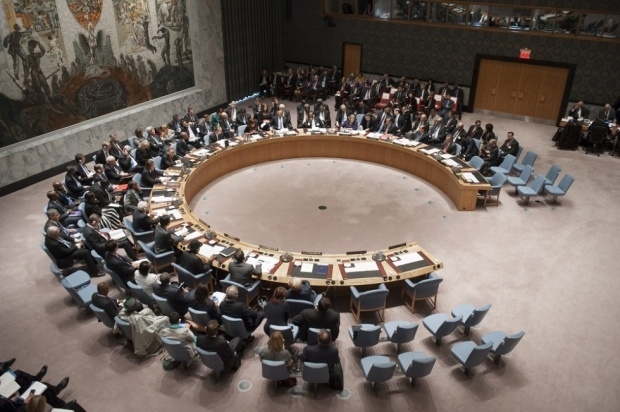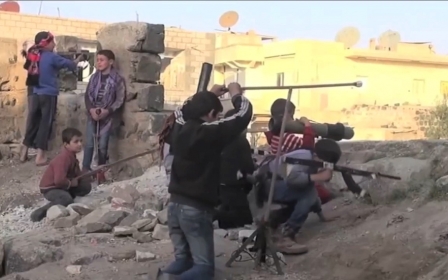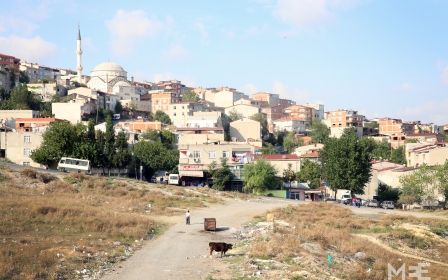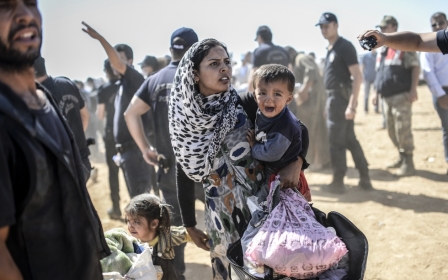Syrian refugees in Egypt struggle amid UN funding crisis

CAIRO - “This place was full of life,” says Jan Abaza, coordinator of the Souriyat Association, as she walked through the empty rooms of the social centre for female Syrian refugees in Heliopolis, Cairo. Until last week Souriyat’s centre echoed with the sounds of playing children, while many rooms were full of women learning skills, attending psychological support sessions, or socialising.
Yet, because the centre’s funding from the United Nations High Commissioner for Refugees (UNHCR) - via the umbrella organisation the Arab Organisation for Human Rights (AOHR) - was slashed, the services they used to offer have been cut almost to the bone.
The centre is only seven months old and there are few social centres like this for Syrian refugee women in Cairo. Souriyat runs vocational training projects, aimed at the most vulnerable women - often those with children and without husbands, who have a limited education and were unable to find work - to teach them skills. The funding cut has meant that small hairdressing and Syrian cookery projects have been scrapped. A sewing and embroidery project - which pays the participants a small salary to make bags and purses which are then sold at bazaars - was supporting 22 women; now the project has been cut to three, on a much-reduced salary.
Nour*, 41, has three children and lost her husband in the war. “Before coming here I had a lot of difficulties meeting people - Syrians or Egyptians,” she says. “I felt depressed at being a refugee and coming to the centre encouraged me to face life and helped me to cope and work.” Nour learned how to embroider and sew, and was making a small salary for her family. Now she no longer receives an income. Although she will keep sewing at home, it will be difficult without the material, social and psychological support from the centre. “I have lost my sense of stability,” says Nour.
Shaimaa*, 36, will continue to work at the centre but on a much-reduced salary. “With my salary I used to pay the rent of my house. Now the income won’t be enough,” she says. Shaimaa has children to support but her husband is in Sweden and is unable to work. In December her UN World Food Programme (WFP) vouchers were cut from 200 EGP per person, per month to 120 EGP. The vouchers are only usable at Carrefour – an upmarket, expensive supermarket in Cairo. Inflation has seen prices continue to rise as the value of the vouchers has almost halved. “We were already living at the minimum level,” says Shaimaa, adding that she has had to adapt by buying even lower-quality food and surviving on less.
The funding cuts are also affecting children’s services. Souriyat has suspended its "Saturday Club" which used to organise trips and activities for around 55-60 children.
In contrast to Souriyat, the Tadamon centre for Syrian Refugees in the Cairo neighbourhood of Faisal was noisy with the sound of kids running around in high spirits. In the dusty yard that passes as a playground, a group of children were busily putting together a broken ping-pong table. The centre offers training and activities for Syrian families, with a strong emphasis on education.
Yet, although the centre appeared busy, it has been forced to dramatically scale back its services since its UNHCR funding ceased on 1 January, 2015. The centre’s general coordinator, Alaa al-Kraidy says that the UNHCR informed him that the decision was due to a lack of funds and says that all the centre’s staff members are now working without pay - many have had to leave to find other work. They have yet to secure new sources of funding.
“We can’t give a service for everybody who needs it because we don’t have enough money,” says al-Kraidy. “The quality of the service is also going down.”
Al-Kraidy says that the centre was previously teaching around 80 Syrian children who were unable to enroll in school due to a lack of spaces and difficulties acquiring residency permits. After the funding cuts, the number of unenrolled children attending the centre fell by around half - the others stay at home. This will have a massive impact on the children’s education and psychological wellbeing, says al-Kraidy: “It affects their future, and the whole family.”
The UN’s funding crisis
As the Syrian conflict enters its fifth year, The UNHCR has called for more international support for Syrian refugees. The UNHCR has registered almost four million Syrian refugees who have fled violence following the uprising against Syrian President Bashar al-Assad that began in March 2011; over 136,000 are registered in Egypt - although the actual number of refugees is likely to be significantly higher.
By the end of last year the UNHCR had raised just 54 percent of the funding needed to assist Syrian refugees outside of Syria. A range of crises in countries such as Iraq, Nigeria and the Central African Republic has also stretched their capacity to provide humanitarian assistance to Syrians, according to a UNHCR spokesperson.
At the moment the bulk of UNHCR funding comes from governments. “There is a kind of ‘donor fatigue’ kicking in because of the length of the [Syrian] crisis and the fact that there is no light at the end of tunnel,” said the UNHCR spokesperson.
According to the spokesperson, there has been a reduction of around 30 percent in the UNHCR’s Syria operational budget; which has translated into a similar cut in the funding for Syrian community organisations in Egypt. The UNHCR is also now providing cash assistance to just 26,000 Syrian refugees in Egypt, down from 56,000 at the beginning of 2014.
The UNHCR say they are focusing on providing “life-saving” assistance for the most vulnerable refugees and are increasingly targeting both private sector funds and individual donations to boost their capacity.
Amina al-Korey, communications officer at the WFP, said that the 40-percent cut in food voucher support to 80,000 Syrian refugees and 3,500 Palestinian-Syrians in Egypt was also a result of funding shortages exacerbated by the length of the conflict. “The value of the voucher still provides refugees with the minimum number of calories that they need to consume to lead a healthy life but certainly limits the choices of what food to buy. A vulnerability assessment is currently underway for Syrian refugees in Egypt to determine their levels of vulnerability and food insecurity,” said al-Korey.
These funding cuts are adding pressure to an already parlous situation for many Syrian refugees in Egypt. Many are unable to acquire residency permits or renew travel documentation. Syrians now find it difficult to get a visa to enter Egypt, which has left many families divided. Many Syrian refugees complain of poor housing, a lack of access to healthcare and education, hostile attitudes, and economic exploitation in Egypt - working long hours, in menial jobs, for low pay - whilst many are unable to find any work at all.
Perilous journeys
The UNHCR’s spokesperson claimed that community organisations may sometimes be too ambitious about their aims, and said they should be looking to build a sustainable model on a longer-term basis, with diverse sources of funding. They added that sometimes other factors, besides a lack of funds, are behind decisions to cut funding to certain organisations.
Abaza says she was told by the UNHCR that Souriyat’s funding cuts were due to a lack of funds. She recognises the need to change Souriyat’s model to diversify funding but says it has proved difficult to find donors without religious or political agendas. The UNHCR will continue to pay the Souriyat’s rent for the rest of the year, and enough for Abaza’s salary and the drastically reduced embroidery project, but there is little left for much else.
Abaza adds that Souriyat will have to rely more on volunteers, and cooperate more closely with Egyptian organisations. “This is important, and it is what we were planning to do, but we just needed more time. I needed one year of UNHCR support, paying our salaries, so we could get established,” says Abaza.
In the meantime, on the eve of the fourth anniversary of the Syrian uprising, the sense of increasing desperation has pushed some Syrian refugee families in Egypt towards dangerous decisions.
Abaza knows many people who have left for Europe by sea, and some who have died attempting the hazardous crossing, but she has been able to convince many of the women to stay. Yet, the recent squeeze in their living standards is making many again consider leaving Egypt by boat.
Shaimaa was set on travelling with her children by boat to join her husband in Sweden, but then she started working at Souriyat: “I lost more than half of my desire to leave because it became stable for me here; I could work and live with the children, until my husband got the papers.” Now that her salary and WFP support has been reduced, she is again eager to leave Egypt, despite the dangers.
Nour has lost all her salary and is now making arrangements to return to Syria with her grown-up daughter and two young sons, even though the family comes from an area of Homs that has been devastated by war and the situation in Syria continues to deteriorate. “[At least] we would be with the rest of our family there.”
*Name has been changed at the request of the interviewee to protect his/her identity
New MEE newsletter: Jerusalem Dispatch
Sign up to get the latest insights and analysis on Israel-Palestine, alongside Turkey Unpacked and other MEE newsletters
Middle East Eye delivers independent and unrivalled coverage and analysis of the Middle East, North Africa and beyond. To learn more about republishing this content and the associated fees, please fill out this form. More about MEE can be found here.




